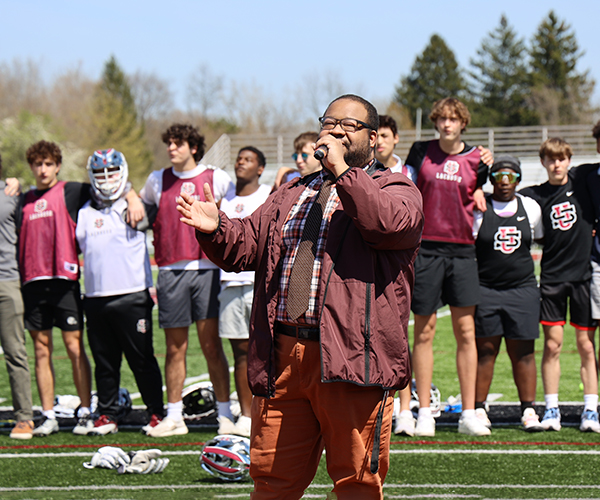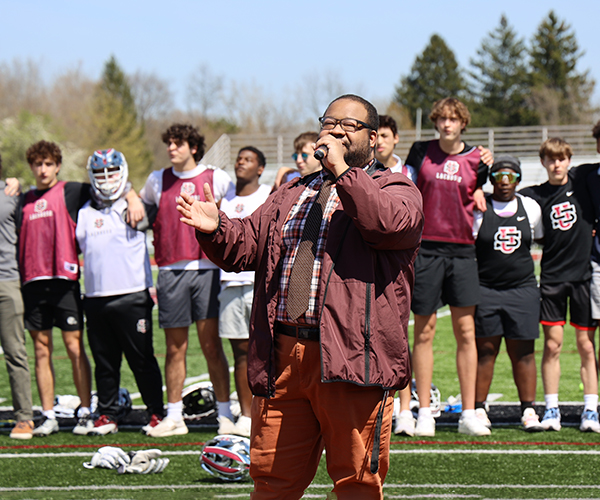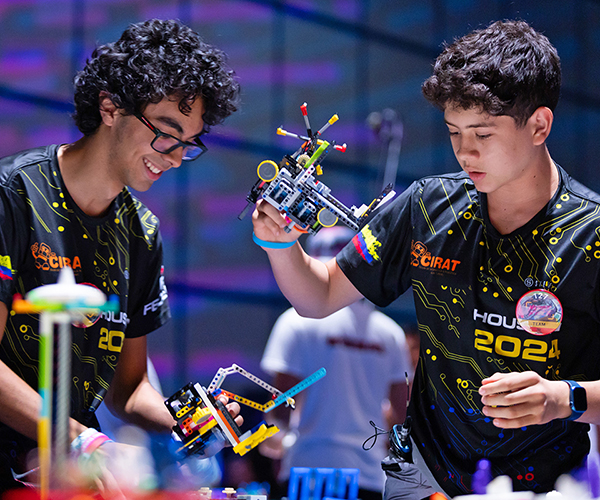Q: How do preschoolers benefit from a Montessori education?
A: "A Montessori education teaches life skills," says Randi Russell, Gilmour Montessori directress. "Children learn how to be in charge of their education. At age 3, they learn how to get their own schoolwork out and put it back ready for the next person. As they grow, they learn how to help others and take a leadership role with the children. In the kindergarten year, all the kindergartners are leaders in the classroom. Older children learn how to help teach the younger ones and gain confidence."
Q: How does The Music Settlement's Music, Math and Movement program help young children with math skills?
A: "We combine the basic fundamentals of music with basic arithmetic," says Laura Simna, a Music Settlement instructor. "There are so many parallels between the structure of music, the structure of rhythm and basic math and arithmetic structure. Cross-referencing these themes proves helpful for children. The movement component provides a new way to learn. Students get an opportunity to move to the music. They feel ratios and subdivisions. It gives them a new way to understand how it fits together."
Q: How will the Hawken School Early Childhood Center, which opens in August, benefit students?
A: "Hawken's new early childhood space will enhance programming by inviting inquiry and exploration and will support the emerging learning style of every child," says Mary Beth Hilborn, Hawken's assistant director of the Lower School. "Research has told us environment is instrumental in creating a sense of community where all members feel valued and safe enough to begin taking social and academic risks. Hawken is designing a space that supports these capacities in young children."
Q: How do students benefit from University School's one-to-one technology program?
A: "The theme going into this school year centered around creativity, innovation and expression," says Gail Stein, University School Lower School director. "Each fifth-grade boy is given a Mac computer to integrate technology into the classroom. We considered what it means to be educated in the 21st century; we believe technology is an important learning resource for educating young boys as it enhances interactivity and encourages creativity and problem solving."
Q: How is Western Reserve Academy looking beyond the classroom?
A: "Each student has a class dean who is there to look after them academically, socially and emotionally," says William Bugg, assistant head of school at Western Reserve Academy. "They help ensure that no student is falling through the cracks. It is important to recognize that student performance in the classroom is linked to their emotional well-being, how they are doing on the athletic field or how they are getting along with their boyfriend or girlfriend. The program acknowledges the need to see the whole person."
Q: How is Beaumont enhancing its science curriculum?
A: "We are starting a new pre-engineering program," says Gretchen Santo, a science teacher at Beaumont. "Girls can take classes to prepare them for an engineering degree in college and can get college credits by performing well on the AP test. ... High-achieving students can enrich their education with experiences such as field trips, professional meetings, talks from scientists and lab activities."
Q: What's next in Andrews Osborne's biodiesel program?
A: "The program is an extension of our chemistry class," says Jim Barbarich, a science teacher at Andrews Osborne Academy. "Students make biodiesel with cooking oil through chemical reactions. Our biggest challenge is dealing with the cold weather. The biodiesel freezes at 32 degrees Fahrenheit and becomes useless. We're trying to come up with alternative procedures with additives. Once the temperature problem is solved, we can use biodiesel in buses and save the school money."
Q: How does Laurel's World Language Program tie into its global initiatives?
A: "We are educating global citizens starting with our youngest students. We teach Chinese, French and Spanish to each student starting in pre-kindergarten, and by third grade she will select one of the three languages to study through Middle and Upper school. Our goal is to have fluency before graduation," says Mary Lisa Geppert, Laurel director of admission and financial aid. "Our older students are exposed to other cultures by traveling to Asia, Europe and Central America on service-learning trips through our Passport program."
Q:How is Hathaway Brown building on its Education Innovation Summit?
A: "The summit allowed us to forge relationships with some of the brightest minds in education, science, business and the arts," says Bill Christ, head of school at Hathaway Brown. "We're collaborating with these and other experts and working to improve the educational landscape. In a special Innovation Derby, HB faculty proposed several new initiatives, many of which are being enacted. We also launched the Center for Educational Innovation and created an online innovation information storehouse."
Q: What are the benefits of your new video game design course?
A: "The game design elective takes the students through how games are designed, gives them examples and then lets them design a game of their own," says Raymond Lambert, superintendent of Ohio Connections Academy. "It appeals to a lot of people who are interested in technology. Learning in the future is going to be more student-centered, and I feel like we need to have emerging computer technology so that we can help students who have a specific interest explore it while they are getting their high school degree."
Q: How does The Cleveland Institute of Art's drawing program help shape an artist's identity?
A: "The students we have are very skillful in terms of craftsmanship," says Sarah Kabot, head of the Drawing Department at the Cleveland Institute of Art. "It's best when students are not only confident, but have flexibility to apply their trait in a number of fields from concept drawings for animation to comic books to big project galleries. Next year we're offering a program designed to prepare students for their final-year thesis."
Q: What are the benefits of Baldwin-Wallace's sustainability programs?
A: "Our new Institute for Sustainable Business Practice seeks to involve the Northeast Ohio business community in efforts to speed up the adoption of sustainable business practices," says David Krueger, co-director of Baldwin-Wallace College's major in sustainability. "Companies that do better with sustainability are going to be better poised to compete and succeed in the 21st century. My goal is to help B-W students understand how fast moving corporate sustainability is so that they can begin to understand how they need to account for this."
Q: How will Lorain County Community College's new outreach center in North Ridgeville help area students?
A: "The major focuses will be to build the community college population there, but also to see what North Ridgeville area residents want so we can offer some programs there as well," says John Crooks, associate provost of the University Partnership at LCCC. "There's a lot of talented students in this community. The biggest challenge is raising their expectations."
Q: How is Kent State making the admissions experience more personal?



